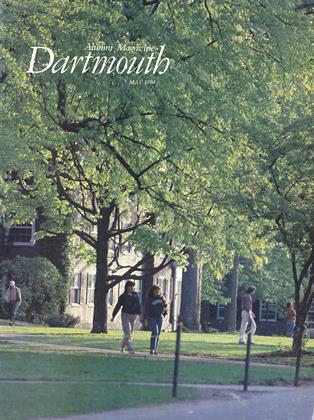Behind a few official-sounding sentences in the annual Organizations,Regulations, and Courses bulletin on the awarding of honors designations in major fields of study, there are some 150 seniors who by-pass a low-key fourth year for two or three terms of intensive work on a thesis and other extra work beyond the normal major and degree requirements. Honors work in one's major is different from the summa, magna, or cum laude designations which recognize a high grade-point average. A 3.0 average is a prerequisite for the departmental honors programs, for which candidates go on to do "work that is clearly greater in depth and scope than that expected in the normal major program."
Dean of the Faculty Hans Penner said that some of the honors theses he knows of, "if polished up a little would be pretty close to being publishable in some pretty good journals." He noted that the kind of scholarly research work that students do on their honors theses is "unique in terms of a learning experience" for undergraduates. "Most students who get into the program," he said, "think it's one of the best pieces of work they've done." He explained that the program gives students a chance to delve in depth into a subject in which they're really interested: "it's not just another course." In addition, many departments' honors programs impose additional work on candidates, such as a demanding reading program, an honors seminar, or an honors examination.
For all of this extra work, successful honors candidates get an invitation to an honors recognition banquet, a listing in the honors section of the commencement program, and "tremendous satisfaction," according to Penner. Plus, two departments have recently established prizes specifically for their honors candidates.
Most academic prizes recognize the "best" work in a field - which may or may not be done by a student in the honors program. However, the economics department has had for a few years a prize for the writer of the best honors thesis each year, and the departments of history and English have just received endowed prizes for outstanding honors work.
The Peter J. Reichard '66 prize in history memorializes a Phi Beta Kappa, summa cum laude graduate of Dartmouth. Reichard went on to earn a master's degree in philosophy, politics, and economics from Oxford University and a law degree from Yale. An expert in international law, he spent many years in Latin America as an associate of the Ford Foundation. He died in September 1980 in a swimming accident in the Indian Ocean.
The English department's honors prize bears the name of the late Arthur Feinstein '55, a Phi Beta Kappa English major. He began studies for a doctorate in English literature at Princeton but shortly before completing his degree switched to civil engineering and returned to earn an M.S.C.E. at Thayer. While carrying on a worldwide engineering career, primarily in water resources, he maintained a strong interest in English literature. He died at his Barrington, III., home in November 1981.
The honors program is "a nice ending to a senior's career" was Penner's summation. And with these two new cash prizes within the honors program, a candle has been added to the icing for some participants in the honors program.
Above a massive hole in the ground between the Hopkins Center and Wilson Hallthat will one day be the Hood Museum of Art, a framework of the edifice-to-be hasbegun to take shape. The construction project is involving renovation in parts of thetwo buildings which will be connected, plus the addition of 34,000 square feet ofnew space for galleries, workrooms, storage areas, and offices. The expected completiondate is the fall of 1985.
 View Full Issue
View Full Issue
More From This Issue
-
 Feature
FeatureFeast and Famine
May 1984 By Laurie Kretchmar '84 -
 Feature
FeatureThe Granite of New Hampshire
May 1984 By Debbie Schupack '84 -
 Feature
Feature"The Highest-Ranking Woman in American History"
May 1984 By Shelby Grantham -
 Cover Story
Cover StoryA Return to Dartmouth
May 1984 By Brian W. Ford '67 -
 Class Notes
Class Notes1959
May 1984 By William G. Long -
 Class Notes
Class Notes1956
May 1984 By Clement B. Malin







